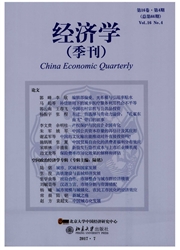

 中文摘要:
中文摘要:
风险承担水平对于企业发展具有重要的作用,本文旨在评估政府补贴对企业风险承担的因果效应。利用1998—2007年《中国工业企业数据库》,本文采用倾向得分匹配基础上的倍差法进行实证检验,结果表明,政府补贴并未在总体上明显提高企业的风险承担水平。进一步的检验发现,不同额度的政府补贴对企业风险承担的影响存在显著的异质性,即只有适度的补贴提高了企业风险承担水平,而高额度政府补贴则倾向于降低企业风险承担水平。最后,我们还构建中介效应模型对此进行影响机制分析,发现"寻补贴"投资和研发激励的弱化是高额度补贴降低企业风险承担水平的重要影响渠道。本文为深入理解中国企业风险承担水平的变动提供了新的思路,同时也为事后客观评估中国政府补贴的经济效果和完善补贴政策的设计提供了微观证据。
 英文摘要:
英文摘要:
Risk-taking is important for corporate development,and this paper we aim to assess the causal effect of government subsidy on corporate risk-taking.Using the firm-level micro data of China from 1998 to 2007,this paper adopts propensity score matching with difference-in-difference(PSM-DID)approach to conduct an empirical study.The results show that government subsidy does not obviously raise corporate risk-taking as a whole.Further tests find that the effects of government subsidy on corporate risk-taking are heterogeneous among different degrees of subsidies,and only moderate subsidy raises corporate risk-taking significantly,while high degree subsidy reduces corporate risk-taking.Finally,the mediating effect analysis shows that,"subsidy-seeking"investment and RD incentive weakening are two important channels for high degree subsidy to reduce corporate risk-taking.This paper provides a new perspective to understand the dynamics of Chinese corporate risk-taking,and it also provides some micro evidences for objectively evaluating the effect of Chinese government subsidy and improving the design of subsidy policy.
 同期刊论文项目
同期刊论文项目
 同项目期刊论文
同项目期刊论文
 期刊信息
期刊信息
